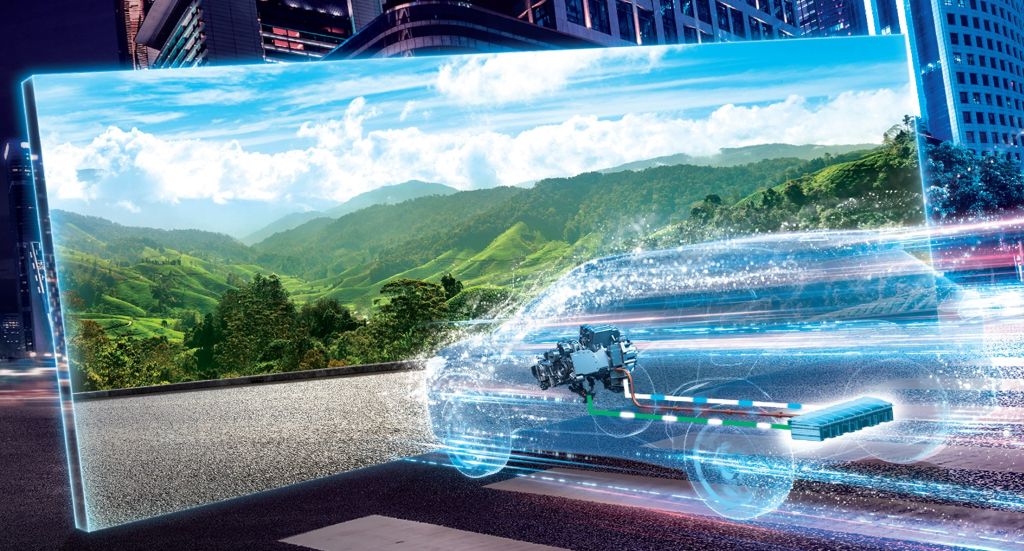Toyota ready to introduce new hybrids to Malaysia
By CARSIFU | 27 September 2021
SHAH ALAM: Nope, no car launch today. Just more build-up from UMW Toyota Motor about the brand's shift to car electrification.
Recall our last post on the matter last Monday that UMW Toyota Motor might dish up the Corolla Cross Hybrid today as many in the motoring press had expected.
Well, that didn't happen. But we are expecting it soon anyway, as the artwork accompanying this article showed an SUV that looks like the Corolla Cross Hybrid.
Basically, what UMW Toyota Motor wanted to say today is that Toyota has the latest hybrid electric cars (HEVs) and that they are ready to be introduced to Malaysia soon.
It went on to plug the virtues of its hybrid technology, now in its fourth generation. It said
Toyota's latest HEVs benefit from having dual power sources, are silent, reliable and have reduced emissions.
The technology had also been put through the rigours of motorsports with Toyota's involvement in Le Mans 24 Hours endurance race and the World Rally Championship.
What UMW Toyota Motor aims to do in Malaysia syncs with Toyota's global ambition to sell 8 million electrified vehicles by 2030.
READ MORE: German auto giants place their bets on hydrogen cars
“For the immediate future, we are absolutely positive that the HEV is the most accessible and realistic choice for Malaysian customers in terms of practicality and infrastructure, with an enormous potential in Malaysia," said UMW Toyota Motor deputy chairman Akio Takeyama.
Toyota has been one of the earliest pioneers of hybrid electric technology and has advanced it for
over 20 years since the introduction of the first generation hybrid Prius in 1997.
Electrified cars today come in the form of Hybrid Electric Vehicle (HEV); Battery Electric Vehicle (BEV); Plug-in Hybrid Electric Vehicle (PHEV) and Fuel Cell Electric Vehicle(FCEV).
They are selectively deployed in various parts of the world depending on what is best suited to the energy policies and readiness of individual countries.
Hybrids and plug-in hybrids are seen as a transition phase to full electric cars, whether powered by battery or hydrogen.
Toyota is also working on e-fuels made from hydrogen designed to improve fuel efficiency dramatically.
UMW Toyota Motor said in terms of CO2 emissions, both HEVs and BEVs have almost similar values from vehicle production, energy generation to ownership over a period of 10 years, making HEVs suitable for local needs based on the current energy mix in Malaysia.
“Toyota HEVs are at their most advanced today, and presents itself as the most realistic, immediate, economical and practical solution for mass market production and sale in terms of reduced CO2 emission, practical usage, and price acceptance by customers.”
In addition, no charging stations are required, Takeyama added.
Tags
Autos Toyota
Reviews

First drive with the 2025 Hyundai Tuscon and Santa Fe: Seoul...

5.8
Kymco AK550 Premium: Smart easy rider

BYD Seal 6 Premium: Sweet deal, generous kit, sensible prici...

8.7
Mazda CX-80 2.5G PHEV AWD High Plus: Upmarket upgrade

Proton X50 Flagship: Tuned for success

6.6
Triumph Trident 660: Beautifully balanced package

8.4
Mercedes-AMG GLA 35 4Matic: Never a dull moment

Lamborghini Urus SE: Ultimate control
Videos

Free & Easy Media Test: Latest Proton X50 Flagship to Kuanta...

Zeekr Space Sunway City Video

Honda Civic Type R Ultimate Edition: Last 40 Units for Europ...
